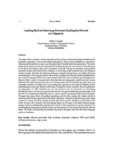Please use this identifier to cite or link to this item:
https://cris.library.msu.ac.zw//handle/11408/1826| Title: | Looking back in order to go forward: reading the proverb on a signpost. | Authors: | Chigidi, Willie L. | Keywords: | African proverbs, folk wisdom, domestic violence, HIV and AIDS, cell-phone farmers, sign posts. | Issue Date: | 2015 | Publisher: | Midlands State University | Series/Report no.: | The Dyke;Vol. 9, No. 1; p. 1-16 | Abstract: | This paper seeks to provide a critical exposition of how African societies have largely benefitted from positively responding to the age old wisdom bequeathed to them by their forefathers as expressed in African proverbs and how in some cases they have failed to benefit when they should have. The writer of this article wishes to pursue the argument that traditional proverbs are as relevant to the situations in the life we live today as they were to situations in the life lived by our ancestors. Every proverb evolved in the past was created to suit a situation, or conversely, certain situations led to the creation of certain proverbs. Situations for which proverbs were created in the past were, most likely, fairly and reasonably light. Now many generations down the line and after more than five decades of independence from colonial rule people behave and create situations that call for the use of those age old sayings more than ever before. In fact, it is purported to show that there are today graver, greater and more serious situations that make some proverbs even more relevant today than the situations for which they were originally created in the distant past. In presenting this argument a case study of Zimbabwe will be used although in some cases reference will be made to situations in other countries. Since the attainment of independence in 1980 Zimbabwe has seen the relevance and use of proverbs in articulating development issues. In some cases government and even non-governmental agencies have made use of proverbs in articulating development issues in order to improve the quality of life of the local people. The paper also shows where, for political expediency and for other reasons, the wisdom carried in certain proverbs has been ignored to the detriment of progress. Examples to illustrate arguments raised are given in areas such as those relating to health, agriculture, gender, childhood and parenthood. The writer arrives at the conclusion that even though people are no longer in the habit of almost always using proverbs to embellish their speeches and to buttress their arguments in various situations it is increasingly becoming obvious that the need to use these proverbs is now greater than has been the case before. The reader is advised that the proverbs discussed in the paper come from the Shona language spoken in Zimbabwe. | URI: | http://hdl.handle.net/11408/1826 | ISSN: | 1815-9036 |
| Appears in Collections: | Research Papers |
Files in This Item:
| File | Description | Size | Format | |
|---|---|---|---|---|
| chigidi.pdf | Full Text | 13.12 MB | Adobe PDF |  View/Open |
Page view(s)
236
checked on Feb 10, 2026
Download(s)
166
checked on Feb 10, 2026
Google ScholarTM
Check
Items in MSUIR are protected by copyright, with all rights reserved, unless otherwise indicated.



